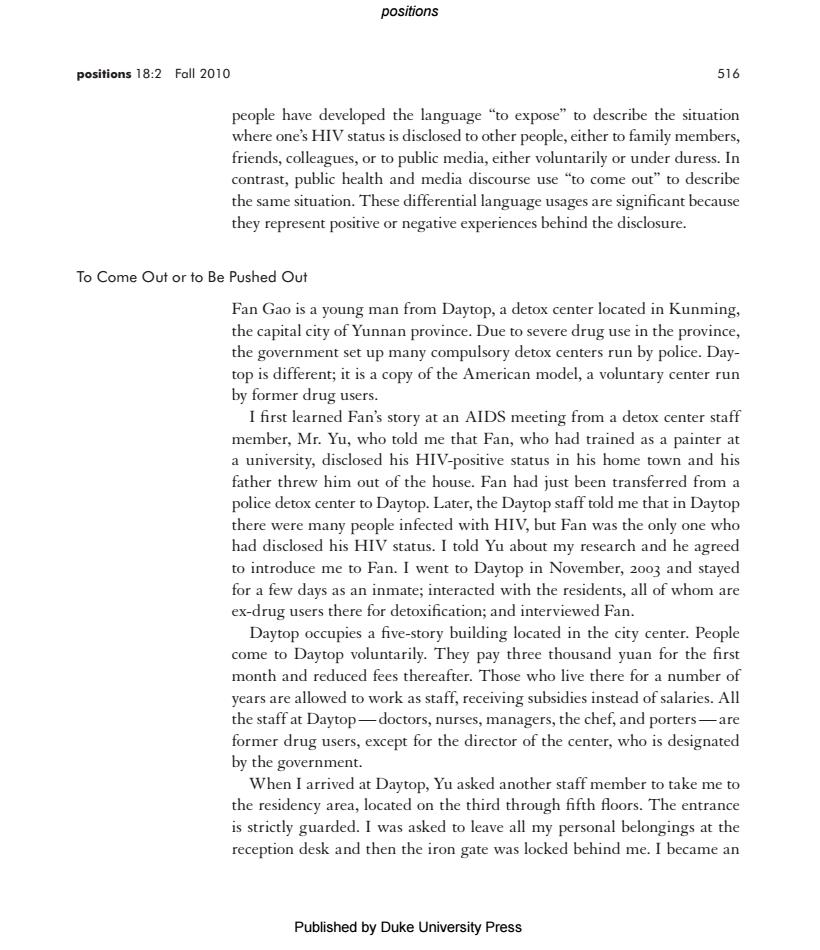正在加载图片...

positions positions 18:2 Fall 2010 516 people have developed the language "to expose"to describe the situation where one's HIV status is disclosed to other people,either to family members, friends,colleagues,or to public media,either voluntarily or under duress.In contrast,public health and media discourse use "to come out"to describe the same situation.These differential language usages are significant because they represent positive or negative experiences behind the disclosure. To Come Out or to Be Pushed Out Fan Gao is a young man from Daytop,a detox center located in Kunming, the capital city of Yunnan province.Due to severe drug use in the province, the government set up many compulsory detox centers run by police.Day- top is different;it is a copy of the American model,a voluntary center run by former drug users. I first learned Fan's story at an AIDS meeting from a detox center staff member,Mr.Yu,who told me that Fan,who had trained as a painter at a university,disclosed his HIV-positive status in his home town and his father threw him out of the house.Fan had just been transferred from a police detox center to Daytop.Later,the Daytop staff told me that in Daytop there were many people infected with HIV,but Fan was the only one who had disclosed his HIV status.I told Yu about my research and he agreed to introduce me to Fan.I went to Daytop in November,2003 and stayed for a few days as an inmate;interacted with the residents,all of whom are ex-drug users there for detoxification;and interviewed Fan. Daytop occupies a five-story building located in the city center.People come to Daytop voluntarily.They pay three thousand yuan for the first month and reduced fees thereafter.Those who live there for a number of years are allowed to work as staff,receiving subsidies instead of salaries.All the staff at Daytop-doctors,nurses,managers,the chef,and porters-are former drug users,except for the director of the center,who is designated by the government. When I arrived at Daytop,Yu asked another staff member to take me to the residency area,located on the third through fifth floors.The entrance is strictly guarded.I was asked to leave all my personal belongings at the reception desk and then the iron gate was locked behind me.I became an Published by Duke University Presspositions 18:2 Fall 2010 516 people have developed the language “to expose” to describe the situation where one’s HIV status is disclosed to other people, either to family members, friends, colleagues, or to public media, either voluntarily or under duress. In contrast, public health and media discourse use “to come out” to describe the same situation. These differential language usages are significant because they represent positive or negative experiences behind the disclosure. To Come Out or to Be Pushed Out Fan Gao is a young man from Daytop, a detox center located in Kunming, the capital city of Yunnan province. Due to severe drug use in the province, the government set up many compulsory detox centers run by police. Daytop is different; it is a copy of the American model, a voluntary center run by former drug users. I first learned Fan’s story at an AIDS meeting from a detox center staff member, Mr. Yu, who told me that Fan, who had trained as a painter at a university, disclosed his HIV-positive status in his home town and his father threw him out of the house. Fan had just been transferred from a police detox center to Daytop. Later, the Daytop staff told me that in Daytop there were many people infected with HIV, but Fan was the only one who had disclosed his HIV status. I told Yu about my research and he agreed to introduce me to Fan. I went to Daytop in November, 2003 and stayed for a few days as an inmate; interacted with the residents, all of whom are ex-drug users there for detoxification; and interviewed Fan. Daytop occupies a five-story building located in the city center. People come to Daytop voluntarily. They pay three thousand yuan for the first month and reduced fees thereafter. Those who live there for a number of years are allowed to work as staff, receiving subsidies instead of salaries. All the staff at Daytop—doctors, nurses, managers, the chef, and porters—are former drug users, except for the director of the center, who is designated by the government. When I arrived at Daytop, Yu asked another staff member to take me to the residency area, located on the third through fifth floors. The entrance is strictly guarded. I was asked to leave all my personal belongings at the reception desk and then the iron gate was locked behind me. I became an positions Published by Duke University Press